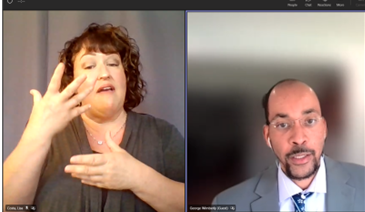June 2022
 |
| ASL Interpreter and George Wimberly |
On June 29, the Institute of Education Sciences (IES) held its most recent Diversity, Equity, Inclusion, and Accessibility (DEIA) Virtual Listening and Learning Series session, “Leveraging LGBTQI+ Voices in Education Research.” George Wimberly, AERA’s director of professional development and diversity officer, was among the seven featured speakers. The session focused on research gaps, data collection, the experiences of LGBTQI+ researchers as scholars, and the work of LGBTQI+ students.
Joining Wimberly as featured speakers were:
- Ed Brockenbrough, University of Pennsylvania
- Joseph Kosciw, GLSEN Research Institute
- Catherine Lugg, Rutgers University
- Elizabeth Meyer, University of Colorado Boulder
- Myeshia Price, The Trevor Project
- Mario Suarez, Utah State University
After an introduction to IES from Laura Namy, associate commissioner for teaching and learning at the National Center for Education Research, Joseph Wheeler from the Department of Education Office for Civil Rights (OCR) provided an update on OCR activities, including the recently released draft of updated Title IX regulations and forthcoming updates to the Civil Rights Data Collection.
Each of the speakers highlighted key areas for consideration and experiences in research with LGBTQI+ communities. Brockenbrough discussed the importance of moving past narratives of victimhood and providing agency for LGBTQI+ students in research, including ensuring multiple research approaches that are authentic to lived experiences and addressing not just what happens to LGBTQI+ youth, but also how to support them.
Lugg detailed a historical perspective of conducting LGBTQI+ research with legal frameworks in mind to obtain IRB approval and gain access to schools. Such access may be further contained in some areas than others due to state legislation that discriminates against LGBTQI+ students.
Kosciw provided background on GLSEN’s work to collect data on a national scale, emphasizing that national data tend to focus more on risk, bullying, and harassment than on supports and resources. Kosciw also called for national surveys to collect data on sexual orientation and gender identity and expression, citing the High School and Beyond 2022 study as one example for potential future surveys.
Meyer described experiences she encountered throughout her career in LGBTQI+ research, noting that the AERA Queer Studies SIG served as a critical network for career development. Meyer also described the struggles she had faced in finding mentors, funding, and publishing outlets for her work.
Price described the importance of considering intersectionalities, noting that LGBTQI+ individuals have historically been lumped together in data categories, erasing the experiences of specific communities. Price also detailed the need for researchers working with LGBTQI+ individuals to include identity categories that are appropriate for the work they are doing.
Suarez highlighted five data collection principles in a report from the National Academies of Sciences Engineering, and Medicine: Measuring Sex, Gender Identity, and Sexual Orientation. These principles include using precise terminology and respecting student self-identification.
Wimberly described training and professional development needs for building the capacity of the LGBTQI+ research field, highlighting AERA’s involvement in mapping out the state of the field and research gaps, as reported in the AERA publication LGBTQ Issues in Education: Advancing a Research Agenda. He stressed the importance of diverse scholars from the LGBTQI+ community, across racial and ethnic groups, receiving more training opportunities. These opportunities should also be provided to researchers from diverse institutions such as HCBUs, HSIs, and other minority serving institutions.
This session was one of several listening sessions that IES has held to inform future work in the agency aimed at broadening participation by institutions and individuals who have traditionally been underrepresented in IES funding. The sessions stem from a Technical Working Group that IES held in 2020, Increasing Diversity and Representation of IES-funded Education Researchers. Wimberly served as a member of the working group panel.